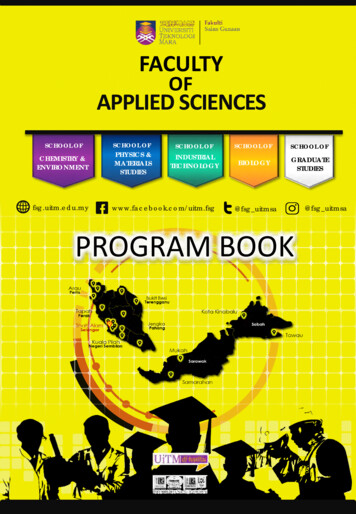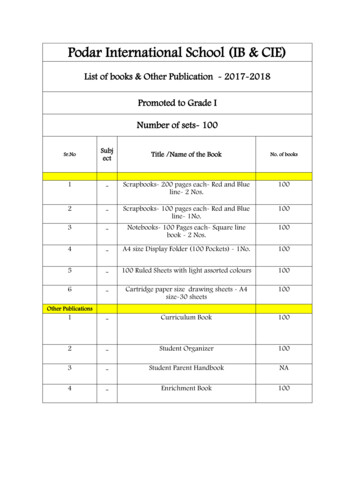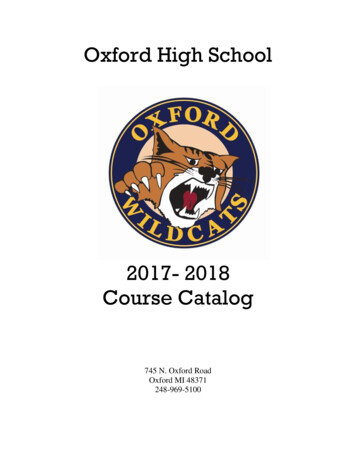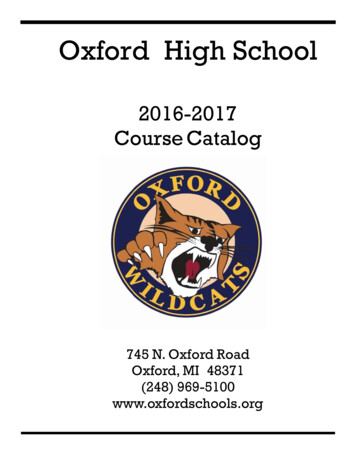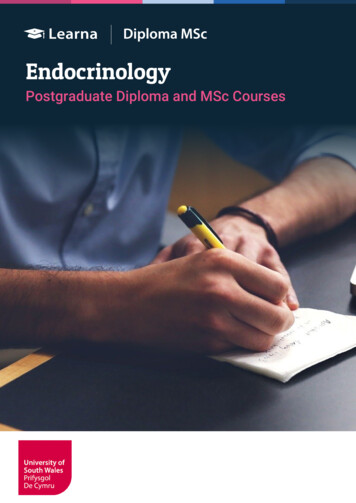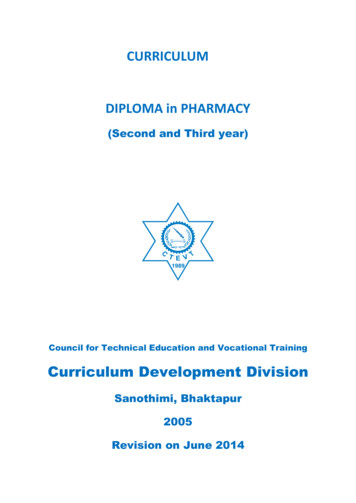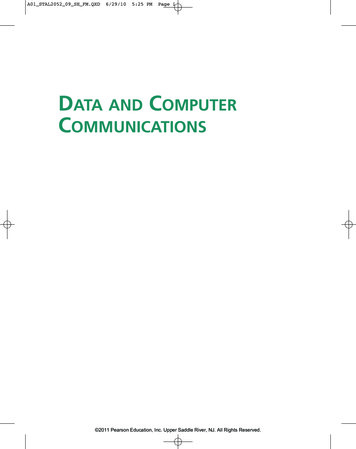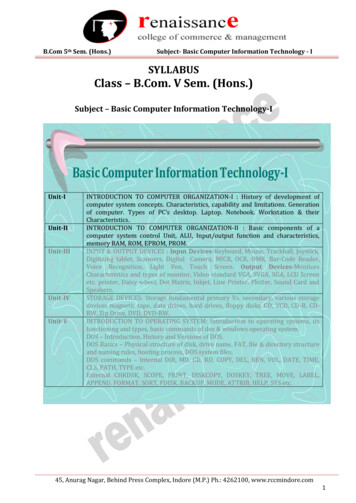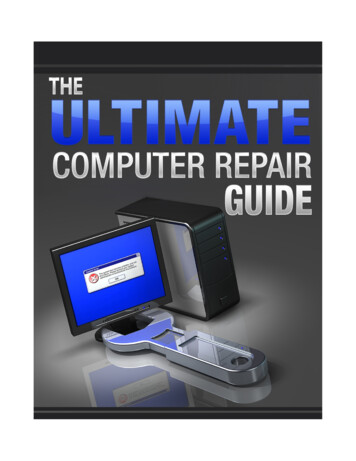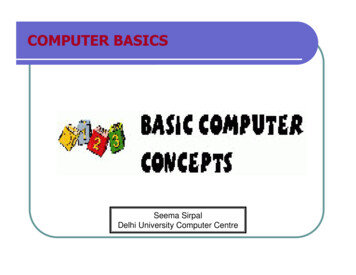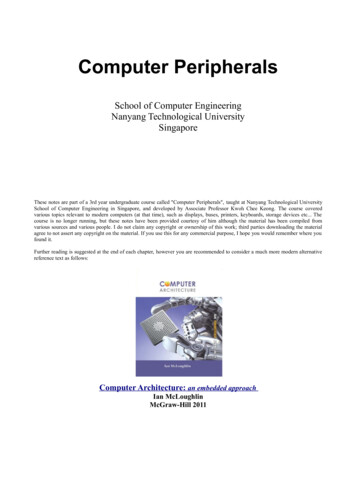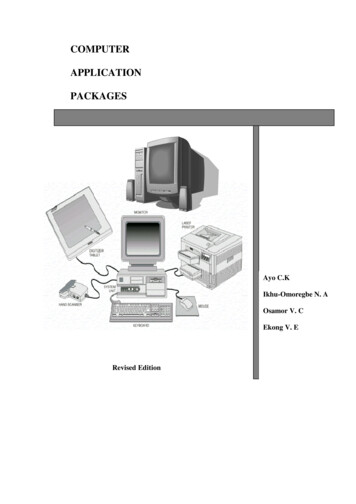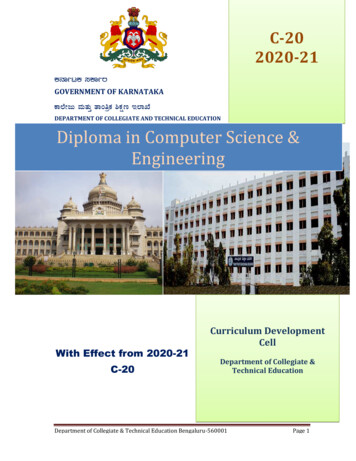
Transcription
C-2020202020-21PÀ ÁðlPÀ ÀPÁðgÀGOVERNMENT OF KARNATAKAPÁ ÉÃdÄ ªÀÄvÀÄÛ vÁAwæPÀ ²PÀët E ÁSÉDEPARTMENT OF COLLEGIATE AND TECHNICAL EDUCATIONDiploma in Computer Science &EngineeringCurriculum DevelopmentCellWith Effect from 2020-212020C-20Department of Collegiate &Technical EducationDepartment of Collegiate & Technical Education Bengaluru-560001BengaluruPage 1
Diploma in Computer Science & Engineering2020-21C20Vision[(To be drafted individually at institution level)]To build a strong learning environment in the field of Computer Science and Engineering thatresponds to the challenges of the centuryMission(To be drafted individually at institution level)M1: To produce computer science diploma graduates who are trained in design, implementation,testing and maintenance of computational systems through competitive curriculum incollaboration with industry and other organizations.M2: Providing state of art facilities for enhancing skills in the field of computer science andengineering.M3:To encourage ethical values and leadership abilities in the minds of students so as to worktowards the growth of the society.Programme Educational Objectives (PEOs)(To be drafted individually at institution level)(After 2/3 years of graduation, the students will have the ability to)1. Attainment of key principles and practices of computation and basic principles of engineeringto ensure that technicians are able to apply their software development skills to implementpractical systems consisting of software and/or hardware components.2. Get hands on domain knowledge to pursue higher education.3. Become socially responsible technicians with good leadership qualities, ethical values andeffective interpersonal skills.PROGRAM OUTCOMES (POs)1. Basic and Discipline specific knowledge: Apply knowledge of basic mathematics, science andengineering fundamentals and engineering specialization to solve the engineering problems.2. Problem analysis: Identify and analyze well-defined engineering problems using codifiedstandard methods.3. Design/ development of solutions: Design solutions for well-defined technical problems andassist with the design of systems components or processes to meet specified needs.4. Engineering Tools, Experimentation and Testing: Apply modern engineering tools andappropriate technique to conduct standard tests and measurements.5. Engineering practices for society, sustainability and environment: Apply appropriatetechnology in context of society, sustainability, environment and ethical practices.6. Project Management: Use engineering management principles individually, as a teammember or a leader to manage projects and effectively communicate about well-definedengineering activities.7. Life-long learning: Ability to analyze individual needs and engage in updating in the contextof technological changes.Department of Collegiate & Technical Education Bengaluru-560001Page 2
Diploma in Computer Science & Engineering2020-21C2023Become socially responsible technicians withgood leadership qualities, ethical values andeffective interpersonal skills.XEnvironmentalConcernXSocietal NeedsXLeadershipQualitiesSelf-LearningXTeam Spirit1Attainment of key principles and practices ofcomputation and basic principles ofengineering to ensure that technicians are ableto apply their software development skills toimplement practical systems consisting ofsoftware and/or hardware components.Get hands on domain knowledge to pursuehigher education.HigherLearningPEO statementsAdapt toIndustryCONSISTENCY MATRIX OF PEO’S WITH MISSIONXXXXXPROGRAM SPECIFIC OUTCOMES (PSOs)Program shall specify 2-4 Program Specific Outcomes(To be drafted individually at institution level)1. Demonstrate skills in the core knowledge areas of Data Structures, Programming Languages,Databases, Software Engineering, Development & testing, Computer Hardware and Networking.2. Apply problem-solving skills and the knowledge of computer science to solve real worldproblems.3. Develop technical project and present the reports effectively1.0 GENERAL PROGRAMME STRUCTURE AND CREDIT DISTRIBUTION1. Definition of Credit:Credit is a kind of weightage given to the contact hours to teach theprescribedsyllabus, which is in a modular form. For courses, one credit is allocated to onecontact hour for theory / tutorial per week and one credit is allocated to 02 contact hours forpractical.2. Choice-Based Credit System (CBCS): CBCS is a flexible system of learning that permitsstudents to learn at their own pace, choose electives from a wide range of elective courses andadopt an inter-disciplinary approach in learning and make best use of the expertise of availablefaculty.Department of Collegiate & Technical Education Bengaluru-560001Page 3
Diploma in Computer Science & Engineering2020-21C203. Range of Credits1 Hr. Lecture (L) per week1 Hr. Practical (P) per week1 Hr. Tutorial (T) per week4 Hrs. Theory (T) per week3 Hrs. Practical (P) per week[1 Hr. Tutorial 2 Hrs. Practical]1 credit0.5 credit1 credit4 credit2 credit4. Programme: Programme means Diploma Programme that is Diploma in Computer Science &Engineering, which is of three years duration.2.0 PROGRAMME STRUCTURE1. Course: A Course is a component (a paper) of a Programme. All the courses need not carrysameweightage. The course should define Course objectives. A course may be designed to involvelectures / tutorials / laboratory work / seminar / project work/ Internships / seminar or acombination of these, to meet effectively the teaching and learning needs and the credits may beassigned suitably.2. Course Code: Each course shall have an alphanumeric code, which includes last two digits of yearof introduction such as 20 subject code CS (CS for Computer Science & engineering, CH for ChemicalEngineering etc. ), then first two digits for example 12 (where 1 represents first semester and 2represents the course number in incremental order) and the last alphabet represent Theory (T),Practical/Internship/Project (P), Drawing (D), Programme / Open Electives (A, B, C, E, F, G ).3. Programme Courses: Each Programme will consist of Communication skills and Social Sciences(HS), Engineering Mathematics, Statistics and Analytics (BS), Engineering Sciences (ES),Professional Core (PC), Professional Electives (PE), Open Electives (OE), EmployabilityEnhancement Courses (EEC) and Internships.1. Communication Skills and Social Sciences: Communication Skills and Social Sciencecourses are incorporated in the curriculum to meet the desired needs of communicationand life skills amongst students.2.Engineering Mathematics, Statistics and Analytics: Common to all EngineeringProgramme to develop reasoning and analytical skills amongst students.3. Engineering Sciences: Engineering Science shall create awareness on differentspecializations of engineering studies. The goal of these courses are to create engineers oftomorrow, who possess the knowledge of all disciplines and can apply theirDepartment of Collegiate & Technical Education Bengaluru-560001Page 4
Diploma in Computer Science & Engineering2020-21C20interdisciplinary knowledge in every aspect. It could be any branch of engineering - Civil,Computer Science and Engineering, Electrical, Mechanical, etc.4. Professional Core: Core Courses designed in the programme which are major courses ofthe discipline, required to attain desired outcomes and to ignite critical thinking skillsamongst students.5. Professional Elective: Generally a course can be chosen from a pool of courses and whichmay be very specific or specialized or advanced or supportive to the discipline or nurturesthe candidate's proficiency/skill is called Professional Elective Course.6. Open Electives: An elective course chosen generally from other discipline/ subject, withan intention to seek interdisciplinary exposure is called an open elective. While choosingthe electives, students shall ensure that they do not opt for the courses with syllabuscontents of which are similar to that of their departmental core/elective courses.7. Audit / Non-Core Courses: An audit / Non-core course is one in which the student attendsclasses, does the necessary assignments, and takes exams. The Institute encouragesstudents towards extra learning by auditing for additional number of courses. The resultsof audit courses shall not be considered for prescribed “carry over courses” limit, howeverstudents need to pass audit courses for awarding the diploma.8. Employability Enhancement Courses: It contains the following courses:a. Mini Project: Mini Project is a laboratory oriented course which will provide a platformto students to enhance their practical knowledge and skills by development of smallsystems/application.b. Seminar: Seminar should be based on thrust areas in state of art technologies. Studentsshould identify the topic of seminar and finalize in consultation with Guide. Studentsshould understand the topic and compile the report in standard format and present infront of Panel of Examiners respective Programme.c. Major Project: Every student must do one major project in the Final year of theirprogram. The minimum duration of project is 6 months. Students can do their majorproject in Industry or R&D Lab or in house or combination of any two.Department of Collegiate & Technical Education Bengaluru-560001Page 5
Diploma in Computer Science & Engineering2020-21C203.0 COURSE CODE AND DEFINITION:Course codeDefinitionsTeachingDept.CodeName of the TeachingDepartmentTeachingDept.CodeName of the TeachingDepartmentLLectureSCScienceMIMechanical Engineering[Instruments]TTutorialCPCRCeramic EngineeringPPracticalMEENCivil Environmental Engg.ANAeronautical Engg.MNHSBSHumanities & SocialSciences CoursesBasic Science CoursesEngineering ScienceCoursesEEISInfo Science &Engg.FTOEAUSIProgram ElectiveCoursesOpen Elective CoursesAudit CoursesSummer InternshipATMCMTCHPOPTPRProjectHPTXTextile TechnologySESeminarWSAutomobile Engg.MechatronicsMetallurgical Engg.MechanicalEngineering [HPT]MechanicalEngineering[Welding & SheetMetal]Mining & Mine SurveyingModern OfficeManagementLibrary and InformationScienceApparel Design andFabrication TechnologyChemical EngineeringPolymer TechnologyPrinting TechnologyEIElectronicInstrumentation & ControlEngg.CinematographyLTESPCPECIESEEProgram Core CoursesContinuous InternalEvaluationSemester EndExaminationCECommercial Practice/ EnglishMechanicalEngineeringElectrical &Electronics Engg.Civil EngineeringElectronics &Commn.Engg.ECMMCSComp Science &Engg.LICNSRPHTDIDSound Recording&Engg.Civil (Public Health &Environment) Engg.Tool & Die MakingInterior DecorationWHMYARLeather & FashionTechnologyWater Technology &Health ScienceMechanical Engineering[Machine Tools]Architecture4.0 INDUCTION PROGRAMMEThe Essence and Details of Induction program can also be understood from the “Detailed Guide onStudent Induction program’, as available on AICTE Portal, although that is for Diploma students ofEngineering & Technology. Suggestive schedule for induction program is given n%20program.pdf)Department of Collegiate & Technical Education Bengaluru-560001Page 6
Diploma in Computer Science & Engineering2020-21C20Induction Program Schedule (Suggestive only)(Induction program for students to be offered right at the start of the first year)SLNO12DAY TIMEACTIVITYVENUE09.3012.30Registration, Formation of Mentor-mentee groups – Introduction ofmentors with-in group.Class rooms ofrespectiveprograms01.3004.30Screening of Institute video clips of various functions held and Photosof various events, Institution ExcursionSeminar hall09.3012.30Prayer- Physical activities such as yoga; Presentation cum InteractiveSession with: Important Institution Functionaries like Principal, HoDsetc.Play ground andseminar 01.3004.301009.3012.3001.30-Visit to Central facilities such as Reading room,library,Sport centre,computer centre, hostel, NSS/NCC cell, community development cellfunctioning in polytechnicLecturer sessions about importance of NSS/NCC/Youth red crossactivities and their contribution towards national building andpersonality and character developmentPersonality development talk on Human valuesInteraction with Alumni students of polytechnic of different programsand interaction with few alumina and sharing their experiencesIntroduction to Swatch barathabhiyan-Importance of abhiyan-Cleandrive in around collegeTalent hunt-Music/Antakshri/Instrument play/ Dance/Team ActivityTourSeminar hallSeminar hallSeminar hallCampusCollegeAuditoriumTalent hunt Activity: Essay/Debate/Best out of Waste/Pick and speak,otherScreening of Movie related: personality development, characterbuilding, motivational ,Environmental concern, Public health, ruralsanitationExchange of views between students and faculty about theirInstitute/program/carrier opportunitiesCollegeAuditoriumGames/Sports ActivitySports groundTalk by training and placement cell: Carrier opportunities for diplomastudents, placement activities in college; placement processTalents hunt Activity: (Street Play/Mime/Acting/Stand Up Comedy/Dance etc.)Personality development talks by eminent speakers on -Leadershipstyles/How to handle failures/stress managementImportance of student union, student union activities, Studentinsurance, How to make student insurance by Student welfare officerof collegeAwareness on: Student scholarship- introduction to SSP portal –e-passportal-Authenticated documents, how to apply in portal: Talk byTaluk/District social welfare officerLocal visits to surrounding places/IndustryTraining andplacement cellDepartment of Collegiate & Technical Education Bengaluru-560001Seminar hallSeminar hallSeminar hallSeminar hallSeminar hallSeminar hallTourPage 7
Diploma in Computer Science & 09.3012.30121201.3004.30Talk on Respective Program scheme of studies and detail of courses,Diploma examination pattern, Passing and eligibility criteria,attendance requirements by respective program coordinatorDepartmentClass roomsVisit to respective programs lab/work shops of institutionTourAwareness camp on human health ,Community health, Personalhygiene-By Local Taluk medical officer/Community medical officerCollection of student feedback on induction program- Make a reportValedictory of two weeks Induction program by collecting student feedbackSeminar hallSeminar hallInduction Program ( mandatory)Two- week DurationInduction program for students to be Physical activityoffered right at the start of the first Creative artsyear. Universal human values Literacy Proficiency modules Lectures by Eminent People Visits to Local Areas Familiarization to Dept./Branch & Innovations5.0 MANDATORY VISITS/WORKSHOP/EXPERT LECTURES:1. It is mandatory to arrange one industrial visit every semester for the students of each branch.2. It is mandatory to conduct a One-week workshop during the winter break after fifth semesteron professional/ industry/ entrepreneurial orientation.3. It is mandatory to organize at least one expert lecture per semester for each branch by invitingresource persons from domain specific industry.6.0 EVALUATION SCHEME:A. For Theory Courses:The weightage of Continuous Internal Evaluation (CIE) is 50% and for Semester End Exam (SEE) is50%. The student has to obtain minimum of 40% marks individually both in CIE and SEE to pass.Theory Semester End Exam (SEE) is conducted for 50 marks (90 Minutes exam duration). Basedon this grading will be awardedB. For Practical Courses:The weightage of Continuous Internal Evaluation (CIE) is 60% and for Semester End Exam (SEE) is40%. The student has to obtain minimum of 40% marks individually both CIE and SEE to pass. Thepractical Semester End Exam (SEE) is conducted for 40 marks (2 Hrs duration exams). Based onthis grading will be awarded.Department of Collegiate & Technical Education Bengaluru-560001Page 8
Diploma in Computer Science & Engineering2020-21C20C. For Summer Internship / Projects / Seminar etc.1. Evaluation is based on work done, quality of report, performance in viva-voce,presentation etc.Note:A. The Continuous Internal Evaluation (CIE) is based on the student’s performance inInternal Assessment tests, student activity, mini project, quizzes, assignments, seminars,viva-voce in practical, lab record etc as specified in respective course curriculum.B. Major Project/Mini Project: Students can do their major project in Industry or R&DLabor in house. Mini Project is a laboratory oriented course which will provide aplatform to students to enhance their practical knowledge and skills by development ofsmall systems/application.C. Personality and character development: It is mandatory for the students from 1stsemester to enroll in any one of the personality and character development programmes(NCC/NSS/YRC/Yoga/Technical Club) and undergo training for their Personality andcharacter development. National Cadet Corps (NCC). National Service Scheme (NSS) will have social service activities inand around the Institution. Youth Red Cross (YRC) will have activities in and around the institution. Yoga Technical Clubs.D. Internship: A minimum of 10 credits (400 Hrs) of Internship/ Entrepreneurial activities/ Project work/ Seminar and Inter/ Intra Institutional Training may be counted towardthree-year diploma programme.E. Mapping of Marks to Grades: Each course (Theory/Practical) is to be assigned 100marks, irrespective of the number of credits, and the mapping of marks to grades maybe done as per the following table:Range of MarksLevel91-100Outstanding81-90Excellent71-80Very Good61-70Good51-60Above Average45-50Average40-44Satisfactory 40FailFail due to shortage of attendance and therefore, torepeat the course/semester.Fail in Continuous internal Evaluation (CIE).Assigned GradeGrade PointA AB BC CDF1009080706050400F*00F**00Department of Collegiate & Technical Education Bengaluru-560001Page 9
Diploma in Computer Science & Engineering2020-21C20Note: Those Candidates who have not obtained requisite minimum pass marks in CIE are not eligible totake up SEE in that course until they get requisite minimum pass marks in the CIE. They may re- registerfor the CIE in the subsequent regular semesters by paying prescribed examination fee.Semester Grade Point Average(SGPA) SGPA and CGPA Calculations [(Course Credits earned)X(Grade Points)] for all thecourses in that semester [Total Course credits applied] for all the courses in thatsemester [(Course Credits earned)X(Grade Points) for all courses,excluding those with F*/F** grades until that semesterCumulative Grade PointAverage(CGPA) [Total Course Credits earned] for all Courses excludingthose with F*/F** grades until that semesterNote: The SGPA and CGPA shall be rounded off to 2 decimal points and reported in the semester Diplomamarks /grade card.A. SGPA and CGPA Calculations: An illustrative example for one academic eGradePoints(GP)CreditsEarned(CE)Credit points(CP CE x GP)SGPA, CGPAIIIIIIICourse 14B744x7 28SGPA CP/CACourse 24F000x0 00Course 34Absent (F)000x0 00 110/22Course 44A944x9 36Course 52A 1022x10 20 5.00Course 62D422x4 08Course 72A922x9 18Total2214110SGPA 5.00stndNote: In 1 semester grade/marks card only SGPA is reported. From 2 semester onwards both SGPA &CGPA will be reported in the grade/marks card.Semest CourseCreditsResultGradeCreditsCreditSGPA, CGPAerCodeAppliedGradePointsEarnedpoints(CP C(CA)(GP)(CE)E x GP)IICourse 1B74x7 28SGPA CP/CA44IICourse 2A94x9 3644 100/19IICourse 3D43x4 1233IICourse 43Absent (F)000x0 00 5.26IIIIIICourse 5Course 6Course 721219I Semester Back log coursesICourse 24ICourse 34Total27A DF1040CD54210144422Department of Collegiate & Technical Education Bengaluru-5600012x10 201x4 040x0 00100CGPA CP/CE (110 136)/(14 22) 246/36 6.834x5 204x4 16136Page 10
Diploma in Computer Science & Engineering2020-21C20 Total credits of the semester excluding the credits of the courses under F/F*/F** grade areconsidered for the calculation of CGPA of the two consecutive semesters under consideration.B. CGPA Calculation of the entire programme: An Illustrative Example.SemesterIIIIIIIVVVITotalCredits of the Semester221924242424137 CP110136184155191188964CGPA 964[110 136 184 155 191 18] 22 19 22 24 24 24137 7.04P Percentage Conversion (CGPA-0.75) X 10Class Declaration:After the conversion of final CGPA into percentage of marks (P), a graduating student is declared tohave passed in:(i) First Class with Distinction (FCD) if P 70%(ii) First Class (FC) if P 60% but 70% and(iii) Second Class (SC) if P 60%.Department of Collegiate & Technical Education Bengaluru-560001Page 11
Diploma in Computer Science & Engineering2020-21C20SCHEME OF STUDIESDIPLOMA IN COMPUTER SCIENCE& ENGINEERING(C(C-20)Department of Collegiate & Technical Education Bengaluru-560001Page 12
CURRICULUM STRUCTUREBS/SC20SC11TEngineering tals of Computers400445020502010040LTPMinMaxMinSGPA and CGPA1Course TitleGrade PointMaxCourse CodeAssigned GradeSEEMarksMin Marks forPassing(including CIEmarks)CIEMarksTotal MarksHours per weekCreditsCourse Category/ TeachingDepartmentS.NTotal contact hrs/weekI Semester Scheme of Studies - Diploma in Computer Science & Engineering [C-20]PRACTICAL COURSES3HS/CS/EG20CS12P4ES/CS20CS13PCommunication SkillsIT 020AUDIT ent SustainabilitySports/NCC/NSS/Youth RedCross/Yoga/ Technical club.Total2002stStudent shall enrol in any one of these activities in 1 semester and shall participate actively. Thestudent shall obtain ‘Participation Certificate’ in the activity to get eligible for the award of Diploma.1408221827010818072450180T:- Theory P:- Practical D:- Drawing E:- Elective BS- Basic Science:: ES-Engineering Science:: HS-Humanities & Social Science:: AU-Audit CourseNote:1.2.3.4.Assigned Grade, Grade Point, SGPA and CGPA to be recorded in the Grade/Marks card.AU- Physical Activity- Student participation in the selected physical activity shall be monitored and the participation record shall be maintained by therespective Programme Coordinator (Head of Section).Theory course Semester End Examination (SEE) is conducted for 50 marks (90 Minutes duration)Practical course CIE and SEE is conducted for 40 marks (120 minutes duration)Department of Collegiate & Technical Education Bengaluru-560001Page 13Only SGPA for 1st SemesterTHEORY COURSES
Diploma in Computer Science & A and CGPAPGrade PointTSEEMarksAssigned GradeLCIEMarksMin Marks forPassing (includingCIE marks)Hours per weekTotal MarksCourse TitleCreditsCourseCodeTotal contacthrs/weekSl.NoCourse Category /TeachingDepartmentII Semester Scheme of Studies - Diploma in Computer Science & Engineering [C-20]1ES/CS/EG20CS21TProject Management Skills2046PRACTICAL COURSES2BS/SC20SC21PStatistics and ndamentals of Electrical &Electronics Engg.Computer Aided EngineeringGraphicsMultimedia & 01610040204646024401610040204646024401610040AUDIT COURSESKannada Kali-I / 13621084550220SGPA & CGPA of 2nd SemesterTHEORY COURSEST:- Theory P:- Practical D:- Drawing E:- Elective BS- Basic Science:: ES-Engineering Science:: HS-Humanities & Social Science:: AU-Audit CourseNote:1.2.3.Assigned Grade, Grade Point, SGPA and CGPA to be recorded in the Grade/Marks card.Theory course Semester End Examination (SEE) is conducted for 50 marks (90 Minutes duration)Practical course CIE and SEE is conducted for 40 marks (120 minutes duration)Department of Collegiate & Technical Education Bengaluru-560001Page 14
Diploma in Computer Science & Engineering2020-21C20Government of KarnatakaDepartment of Collegiate and Technical EducationBoard of Technical Examinations, BangaloreCourse Code20SC11TSemesterICourse TitleENGINEERINGMATHEMATICSCourse GroupCoreNo. of Credits4Type of CourseLectureCourse CategoryTheoryTotal Contact Hours4Hrs Per Week52Hrs Per SemesterPrerequisites10thLevel MathematicsTeaching Scheme(L:T:P) 4:0:0CIE Marks50SEE Marks50RATIONALEEngineering Mathematics specification provides students with access to important mathematicalideas to develop the mathematical knowledge and skills that they will draw on in their personal andwork lives. The course enable students to develop mathematical conceptualization, inquiry,reasoning, and communication skills and the ability to use mathematics to formulate and solveproblems in everyday life, as well as in mathematical contexts. At this level, the mathematicscurriculum further integrates the three content areas taught in the higher grades into three mainlearning areas: Algebra; Measurement of angles and Trigonometry and Calculus.1. COURSE SKILL SETStudent will be able to:1. Solve system of linear equations arise in different engineering fields.2. Incorporate the knowledge of calculus to support their concurrent and subsequentengineering studies.3. Have the idea of vector calculus, its physical interpretation and applications in real lifeexamples.2. COURSE OUT COMESAt the end of the course, student will be able toCO1Apply the concepts of matrices and determinants to solve real life problems which areexpressed in the form of the system of linear equations.CO2Calculate trigonometric ratios of any magnitude in solving problems of engineeringconcepts.CO3Represent vectors in 2 and 3 dimensions. Find dot and cross product of vectors andapply it engineering fields.CO4Find the equation of straight line in different forms. Determine the parallelism andperpendicularity of lines.CO5Differentiate various continuous functions and apply the concept in real life situations.Department of Collegiate & Technical Education Bengaluru-560001Page 15
Diploma in Computer Science & EngineeringCO62020-21C20Integrate various continuous functions and apply the concept in evaluating the area andvolume through definite integrals.3. SUGGESTED SPECIFICATION TABLE WITH HOURS & MARKSUNITNOUNIT ALEVELTOTAL1Matrices and Determinants64610202Trigonometry104610203Vector Calculus8235104Straight al Calculus. andapplicationsIntegral Calculus. andapplicationsTotalLegends: R Remember; U Understand; A Apply and above levels (Bloom’s revisedtaxonomy)4. DETAILS OF COURSE CONTENTThe following topics/sub topics is to be taught and assessed in order to develop Unit Skill sets forachieving CO to attain identified skill sets.UNIT-1MATRICES ANDDETERMINANTSUNITNOUnit skill set(In cognitive domain)Topics/Sub topicsHoursL-T-P1. Usecomputationaltechniques and algebraicskills essential for thestudy of systems of linearequations, matrix algebra,eigen values and eigenvectors,1.1 Matrixandtypes,AlgebraofMatrices(addition, subtraction, andmultiplication)1.2 Simple problems on algebra of matrices1.3 Evaluation of 2x2 and 3x3 determinants1.4 Cramer’s rule for solving system oflinear equations involving 2 and threevariables.1.5 Adjoint and Inverse of the nonsingular matrices.1.6 Characteristic equation and Eigenvalues of a 2x2 matrix.06-0-0Department of Collegiate & Technical Education Bengaluru-560001Page 16
Diploma in Computer Science & EngineeringUNIT-2TRIGONOMETRY1. Able to find the equation ofstraight lines in differentforms.2. Determine whether linesareparallelorperpendicular.3. Determine whether thelines intersect or not.4.14.24.34.44.54.6UNIT-5DIFFERENTIAL CALCULUSAND APPLICATIONSUNIT-4STRAIGHT LINES1. Represent a vector in 2Dand 3D form2. Determine the projectionof two vectors and workdone by the force.3. Use the basic properties ofvectorstodetermineMoment of the force4. Able to find the area of thetriangle and parallelogramformed by vectors.3.1UNIT-3VECTOR CALCULUS2.1 Conceptofanglesandtheirmeasurement. Radian measure andrelated conversions.2.2 Trigonometric ratios of allied angles.2.3 Trigonometric ratios of compoundangles(without proof)2.4 Transformation formulae(product tosum and sum to product)2.5 Solution to triangles(sine rule andcosine rule)1. Use basic trigonometricskills in finding thetrigonometric ratios ofallied and compoundangles.2. Able to find all themeasurable dimensions ofa triangle.1. tric, logarithmicand composite functions.2. Able to find higher orderderivatives.3. Understand and work withderivatives as rates ofchange in mathematicalmodels.4. Find local maxima andminima of a function.2020-213.23.33.43.5Algebra of vectors(add, subtract,multiply,positionvectorsandcomponents of 2D and 3D vectors)Dot product of vectors and Cosine ofangle between vectors.Determine the projection of vectorsand work done by the force.Cross product of vectors Sine of anglebetween the vectors.Area of the triangle and parallelogramand Moment of the forceSlope of a lineSlope-point formulaTwo-point formSlope intercept formGeneral form of a straight lineConditions for lines to be parallel orperpendicular.4.7 Equation of a line parallel orperpendicular to the given line.4.8 Conditions for lines to intersect.5.1 Derivatives of continuous functions inan interval.5.2 Sum rule, difference rule, product ruleand quotient rule.5.3 Chain rule5.4 Successive differentiation(up to secondorder)5.5 Rate and measure. Find the velocity andacceleration of a displacement vector atany point of time.5.6 Local Maxima and Minima of a function.Department of Collegiate & Technical Education Bengaluru-560001C2010-0-008-0-008-0-010-0-0Page 17
UNIT-6INTEGRAL CALCULUSAND APPLICATIONSDiploma in Computer Science & Engi
of introduction such as 20 subject code CS (CS for Computer Science & engineering, CH for Chemical Engineering etc. ), then first two digits for example 12 (where 1 represents first semester and 2 represents the course number in incremental order) and the last alphabet represent Theory (T),
